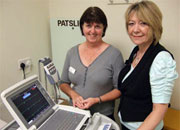More information is available on the visiting page
Electrocardiogram (ECG)
An ECG is performed by placing 10 recording leads at certain specific locations on the body. They only record the heart’s electrical activity. They do not produce any electricity of their own. The test does not hurt and has no known side effects.
It does not require any preparation (except for possibly shaving chest hair to get a better recording). The recording itself takes only a few seconds. Including the setup time and the time to disconnect the leads, the whole procedure takes about 5 minutes.
Why 12 leads? Looking at the heart with 12 leads is like looking at a sculpture, building or car from multiple angles. The more points of view you have, the more you learn about it.
By looking at the electrical patterns on an ECG, your doctor can determine:
- The nature of an erratic heartbeat. There are many different types of abnormal heartbeats. Not all require treatment. For those that do, the ECG recording lets the doctor know which treatment is best
- The presence of a heart attack and whether the attack is old or recent.
- The possibility that there are narrowed arteries in the heart which may lead to a heart attack in the future
- Whether or not discomfort in the chest is being caused by the heart
- Degeneration of the conduction system of the heart which can lead to dangerously slow heartbeats. This condition is often treated with a pacemaker
- The possibility of congenital heart disease.


